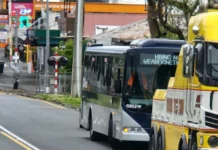A Senior Magistrate in Nuku’alofa has temporarily banned law enforcement authorities from collecting money from people who have been fined under new road safety measures the government signed into law in October 2020.

The magistrate has ordered the new traffic, land transport and vehicle use laws to be revised, citing concerns over the large amounts of money fines it has imposed, the Kakalu ‘O Tonga newspaper reported.
The paper cited government sources who supported the Magistrate’s decision and claimed the basis on which the law was created appeared to be invalid.
The new law, which was introduced by the Minster of Transport ‘Akosita Lavulavu included the compulsory wearing of seatbelts, made the use of mobile phones while driving illegal and mandated that cars cannot be used without a registration plate.
READ MORE:
- Nuku‘alofa Senior Magistrate orders new traffic, land transport and vehicle use laws to be revised, wants fine collections to be stopped
- Supreme Court warns Hon. Lavulavu to follow the law, reinstates whale watching licenses
- ‘Akosita claims she was humiliated by spat over seating during meeting in Fiji
- Landlord sues Infrastructure Minister and husband ‘Etuate Lavulavu over allegedly forged letter to Lands Ministry claiming he agreed to allow ‘Etuate quarrying his land
- Lavulavus killing whale watching industry claims Sika, as experienced operator says new licenses put extra pressure on whales
Children must also be seated when a vehicle is in motion, and they can no longer sit on the driver’s lap.
Playing loud music, extreme tinting and the addition of blinking, colourful or distracting lights have also been prohibited.
At the time, Hon. Lavulavu said the laws would make Tonga’s public roads safer.
The deadliest year on the roads in the past 10 years was 2018, with 21 deaths.
“The Traffic Act 2020 and the Roads Act 2020 have long been discussed and consulted on with the public and by the government during its passage through the legislative assembly,” the Ministry of Infrastructure said.

Criticisms
The law had been widely criticised by the public from the outset both in the local news and social media.
The gist of the condemnation has been that while the vast majority of people in Tonga owned vehicles, they did not have sources of income.
Critics cited sources from police who claimed most fatal accidents in Tonga were caused by speeding and drink driving.
Late last year photos of vehicles in Ha’apai shared on social media showed pick up vans full of people standing in the back while the vans were moving.
This was typical in December when villages only had pick up trucks to transport their supporters and players during the basketball season.
Commentaters on Facebook have asked what the government could do for these passengers and drivers of the Ha’apai pick up when the law for seatbelts was already in place.
Some believed the seatbelts law did not consider the fact that pick up trucks had been used to transport people in Tonga for a long time. They claimed that these vehicles appeared to have rarely been involved in road accidents.
Supporters of the law said if all drivers and passengers followed what the law stipulated Police would hardly fine anybody.

Loud music
The new law says that anybody playing loud music without permission while driving will face a fine of TP$500 for the first offence, a month in jail if they do not pay the fine and a TP$1000 fine for each subsequent offence, or three months in prison.
The Court can also also order that the convicted person be disqualified from holding or obtaining a driver’s license for a year.
Seatbelts
Every person driving a motor vehicle or riding in the front seat of a motor vehicle (other than a motor cycle) who does not wear an adult seatbelt commits an offence. This does not apply to a person riding in the front seat who is under 12 years
The Principal Licensing Authority may declare by notice in the Government Gazette additional mandatory requirements for motor vehicles to have working seatbelts before registration and licencing, and any additional requirements for rear seats and infant seats. It shall not be a defence to any person charged with driving or riding in the front of a motor vehicle without wearing an adult seatbelt, if the motor vehicle does not have seatbelts, or has defective seatbelts. Anybody who fails to comply with any of the provisions of this section will be guilty of an offence.







